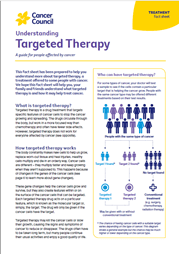- Home
- Stomach cancer
- Treatment
- Targeted therapy
Targeted therapy for stomach cancer
This is a type of drug treatment that attacks specific features of cancer cells to stop the cancer growing and spreading.
Learn more about:
- How it works
- Targeted therapy side effects
- Video: What is targeted therapy?
- Podcast: Immunotherapy and targeted therapy
How it works
HER2 (human epidermal growth factor receptor 2) is a protein that causes cancer cells to grow. If you have HER2-positive advanced stomach or gastro-oesophageal junction cancer, you may be given a targeted therapy drug called trastuzumab. This drug destroys the HER2-positive cancer cells or slows their growth. Trastuzumab is given with chemotherapy every 2–3 weeks through a drip into a vein.
Another targeted therapy drug called ramucirumab aims to reduce the blood supply to a tumour to slow or stop its growth. It has been approved to treat advanced stomach or gastro-oesophageal junction cancer that has not responded to chemotherapy, but is not subsidised by the Pharmaceutical Benefits Scheme (PBS).
To learn more, see our general section on Targeted Therapy.
Side effects of targeted therapy
Ask your doctor what side effects to expect. Possible side effects of trastuzumab include fever and nausea. In some people, trastuzumab can affect the way the heart works. Possible side effects of ramucirumab include stomach cramps, diarrhoea and high blood pressure. Tell your doctor about any side effects immediately.
You may be able to access other new drugs to treat stomach cancer through clinical trials. Talk to your doctor about the latest developments and whether there are any suitable clinical trials for you.
→ READ MORE: Immunotherapy for stomach cancer
Video: What is targeted therapy?
Watch this short video to learn more about targeted therapy.
Podcast: Immunotherapy & Targeted Therapy
Listen to more episodes from our podcast for people affected by cancer
More resources
Prof David I Watson, Matthew Flinders Distinguished Professor of Surgery, Flinders University, and Senior Consultant Surgeon, Oesophago-Gastric Surgery Unit, Flinders Medical Centre, SA; Prof Bryan Burmeister, Senior Radiation Oncologist, GenesisCare Fraser Coast and Hervey Bay Hospital, QLD; Kieran Cahill, Consumer; Jessica Jong, Clinical Dietitian, Upper GI and Hepatobiliary Services, Peter MacCallum Cancer Centre, VIC; John Leung, Consumer; Prof Rajvinder Singh, Professor of Medicine, University of Adelaide, and Director, Gastroenterology Department and Head of Endoscopy, Lyell McEwin Hospital, SA; Dr Sarah Sutherland, Medical Oncologist, Chris O’Brien Lifehouse, NSW; Paula Swannock, Upper GI Cancer Nurse Consultant, St Vincent’s Hospital Melbourne, VIC; Rebecca Yeoh, 13 11 20 Consultant, Cancer Council Queensland.
View the Cancer Council NSW editorial policy.
View all publications or call 13 11 20 for free printed copies.

